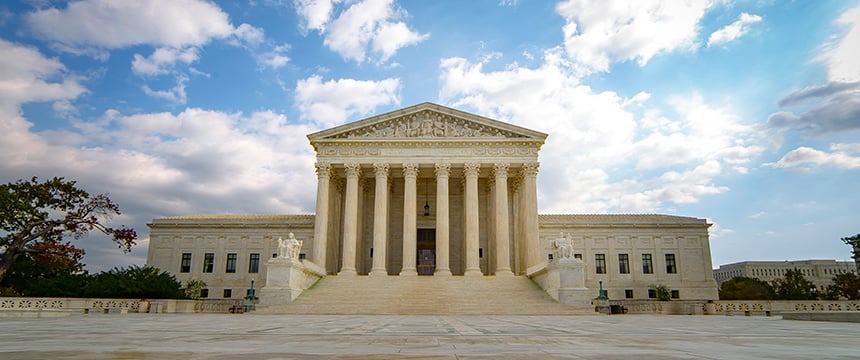U.S. Supreme Court Rules SEC Must Try Securities Fraud Cases in Federal Jury Trials Rather than In-House Courts

On June 27, 2024, the U.S. Supreme Court ruled that when the SEC seeks civil penalties against a defendant for securities fraud, the Seventh Amendment entitles the defendant to a jury trial. In a 6–3 decision, Chief Justice Roberts delivered the opinion of the court, joined by Justices Thomas, Alito, Gorsuch, Kavanaugh, and Barrett, with a concurrence filed by Justice Gorsuch (joined by Justice Thomas) and a dissent filed by Justice Sotomayor (joined by Justices Kagan and Jackson).
How Did We Get Here?
Until the passage of the Dodd-Frank Act in 2010, the SEC had to go to federal court to obtain civil penalties in cases against unregistered entities. The Dodd-Frank Act allowed the SEC to impose such penalties in its own in-house proceedings as an alternative to the traditional federal court option.
This preceded a 2013 enforcement action initiated by the SEC against George Jarkesy, Jr. and Patriot28, LLC. Specifically, in connection with two investment funds launched by Jarkesy between 2007 and 2010, the SEC alleged Jarkesy and Patriot28 misrepresented investment strategies, lied about the identity of the funds’ auditor and prime broker, and inflated the funds’ value to collect larger fees. The SEC sought civil penalties for the alleged securities fraud by Jarkesy and Patriot28, and the SEC elected to adjudicate the matter in-house before one of its administrative law judges (ALJ) in lieu of a jury trial in federal court. In 2014, the ALJ presiding over the case ordered civil penalties against Jarkesy and Patriot28. After Jarkesy and Patriot28 petitioned for judicial review, the Fifth Circuit granted their petition and vacated the final order, holding that the SEC and ALJ’s adjudication violated Jarkesy and Patriot28’s Seventh Amendment right to a jury trial. After the Fifth Circuit denied rehearing en banc, the U.S. Supreme Court granted certiorari.
This set the stage for the Court to consider a relatively straightforward issue: if the SEC is permitted under the Seventh Amendment to force defendants to be tried before the agency rather than before a jury in federal court.
Supreme Court Decision
The Court highlighted the procedural differences between cases tried in federal court as compared to those adjudicated in-house by the SEC. When before a federal court, a jury is the factfinder (depending on the nature of the claims), an Article III judge presides over the case, and the case is governed by the Federal Rules of Evidence as well as ordinary discovery rules. In cases where the SEC elects to adjudicate the case in-house, there is no jury and the SEC or an ALJ employed by the SEC presides over the case, finds facts, decides discovery disputes, makes evidentiary determinations, and relies on the SEC’s Rules of Practice for governance of the case.
The Court determined that the SEC’s antifraud provisions replicate common law fraud, which must be heard by a jury, because the available civil penalties are punitive rather than restorative or compensatory. The Court also noted the similar causes of action between this case and common law fraud (misrepresenting or concealing material facts). Proceeding from this starting point, the Court considered whether the “public rights” exception to Article III jurisdiction was applicable. This exception allows Congress to assign certain matters to administrative agencies for adjudication in lieu of a jury trial. The Court held that the case before it did not fall into any of the distinctive areas in which the “public rights” exception was applicable. The Court stressed that the test for a “public rights” exception focuses on “the substance of the action, not where Congress has assigned it.” Again, focusing on the punitive civil penalties and similarities to common law fraud (“[t]his is a common law suit in all but name”), the Court determined that Congress is disallowed from removing such cases from the constitutional mandated judicial procedures.
Thus, the Court decided, the Seventh Amendment applies, and a jury is required. Given that the jury trial question resolved the issue underlying the case, the Court did not consider issues related to nondelegation or removal.
The Court’s decision stressed the historical importance of the right to a jury trial, harkening its Revolutionary roots, and the utmost scrutiny that should be applied to any curtailment of this right. The conclusion: “[a] defendant facing a fraud suit has the right to be tried by a jury of his peers before a neutral adjudicator.”
Justice Gorsuch’s concurrence highlighted the implications of other constitutional provisions that interplay with the Seventh Amendment, specifically Article III and the Due Process Clause of the Fifth Amendment. Justice Sotomayor’s dissent argued for the application of the “public rights” exception.
The Court’s decision is important, as it continues the current Court’s trend of limiting the administrative state and deals a blow to the autonomous power of the SEC in securities fraud cases. Since 2018, the number of ALJ cases has been decreasing, possibly in response to cases like Lucia v. SEC, and the Jarkesy decision may reinforce that trend. Further, as noted in Justice Gorsuch’s concurrence, “[a]ccording to one report, during the period under study the SEC won about 90% of its contested in-house proceedings compared to 69% of its cases in court.” The impact on the SEC and other administrative agencies will be something to monitor going forward, particularly as to whether this reduces the number of such cases being brought or lowers the agencies’ success rate in trying such cases.
If you have any questions about this Court decision, reach out to any of the authors or your Foley & Lardner attorney.

